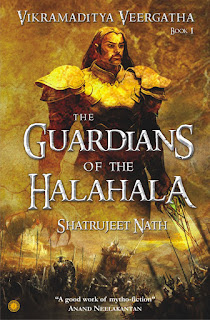*** Special Feature - September 2016 ***
Posts So Far:
1st September - Introducing the Shatrujeet Nath
15th September - Excerpt from The Conspiracy at Meru
22nd September - Excerpt from The Karachi Deception
22nd September - Excerpt from The Karachi Deception
About the Books:

VICTORY IS TEMPORARY. THE BATTLE IS ETERNAL.
Vikramaditya and his Council of Nine have fought valiantly to repel the rampaging hordes from Devaloka and Patala – but Avanti has been brought to its knees. Ujjayini lies battered its citizens are scared and morale is badly shaken. Meanwhile, the barbaric Hunas and Sakas are gathering on the horizon and cracks are emerging between the allied kingdoms of Sindhuvarta.
The only silver lining is that the deadly Halahala is safe. For now.
Bent on vengeance, Indra is already scheming to destroy Vikramaditya, while Shukracharya has a plan that can spell the doom for the Guardians of the Halahala. How long can the human army hold out against the ferocity and cunning of the devas and asuras? And will Vikramaditya’s love for his queen come in the way of his promise to Shiva?

The deadly Halahala, the all-devouring poison churned from the depths of the White Lake by the devas and asuras, was swallowed by Shiva to save the universe from extinction.
But was the Halahala truly destroyed?
A small portion still remains – a weapon powerful enough to guarantee victory to whoever possesses it. And both asuras and devas, locked in battle for supremacy, will stop at nothing to claim it.
As the forces of Devaloka and Patala, led by Indra and Shukracharya, plot to possess the Halahala, Shiva turns to mankind to guard it from their murderous clutches. It is now up to Samrat Vikramaditya and his Council of Nine to quell the supernatural hordes – and prevent the universe from tumbling into chaos!
A sweeping tale of honour and courage in the face of infinite danger, greed and deceit, The Guardians of the Halahala is a fantastical journey into a time of myth and legend.
Three commandos of the Indian Army’s elite Unit Kilo—Major Imtiaz Ahmed, Captain Shamsheer Suleiman and Lieutenant Rafiq Mehmood—are chosen for a one-of-a-kind ops mission: to enter Pakistan and eliminate dreaded underworld don, Irshad Dilawar. However, somehow, the Inter-Services Intelligence and Dilawar always seem to be one step ahead of them, foiling every plan they make. It doesn’t take long for Major Imtiaz to realize that something is amiss—the operation has been compromised. Will he be able to successfully complete his mission, or are he and his men, like Abhimanyu, entering a trap they cannot make their way out of? Set in the world of covert operations, where double-crossing and diabolical mind games are the norm, The Karachi Deception will keep you hooked till the very end.
An Interview with the Author
Why did you use “Veergatha” as a series descriptor instead of something like Chronicles or Legends?
The moment Sandhya (my editor at Jaico) and I realized that this series would end up as four and not three books, we knew we’d have to change the series descriptor from Vikramaditya Trilogy to something else. ‘Quartet’ was obvious, but neither of us liked it. So we began looking at other options – chronicles, saga, legends etc. The problem with all these extensions were that they had all been done many times before, so there was no novelty in left. Not to say that the earlier ‘trilogy’ was very original, but somehow trilogy worked where the newer options weren’t.
We had run through all options and were thoroughly dissatisfied when ‘veergatha’ suggested itself as a possibility. The word literally means ‘a narrative or poem of valour’, and is commonly used in many Indian languages to describe epic narratives. It is a uniquely Indian word, which was quite in keeping with the uniquely Indian tale that I am telling. It’s a word most Indians would intuitively understand, and it put alongside ‘Vikramaditya’ it had the alliterative quality that sits well with descriptors. And it was novel, so we went ahead with it.
At what point did you realise that this series would be more than three books long?
As I was finishing Book 2 (The Conspiracy at Meru), I began coming to terms with the fact that I would, in fact, end up writing four books in the series. The thing is that the scope and scale of the story broadened dramatically while writing Book 2 – or maybe the scope and scale was always broad and I just didn’t see that before. Whichever be the case, it became obvious that to accommodate the story, we would have four books now. From what I gather from readers who’re fans of the series, they are more than happy if the series swells to even five books.
The Game of Thrones started as a trilogy as well, but ended up as 6-7 books. Your series is now into 4 books. Do authors have even the slightest idea of what they are getting into when they start writing an epic story? Or do they only feign confidence and knowledge when in reality they are as clueless as the next person?
The simple and obvious answer to whether authors have the slightest idea of what they are getting into – no. See, the reality is that most authors embark on a story with little more than a concept that would fill, say, four to six pages. In fact, it is a minor miracle that authors actually produce 70,000-word stories out of the threadbare ideas they start with. When I started writing Vikramaditya, I estimated that I had enough material to fill three books. Once I began writing, however, new tracks and sub-plots emerged that I hadn’t taken into account earlier. These grew from the story organically, and as they were good for the story, I kept them. Now I have to take all such tracks and plots to their logical conclusion, and that has expended the scope of the narrative. I suspect this is also what must have happened with George RR Martin – on a much bigger scale, of course.
Who is your favourite character in the Vikramaditya series and why?
Shanku. From the time her character first took shape, Shanku has fascinated me. For starters, she is the archetypal underdog – her father is a traitor languishing in Avanti’s dungeons, while her gypsy mother killed herself out of shame – and survivor. But what intrigues me more is that Vikramaditya saw something in her that made him appoint her as a member of his respected council. And all her fellow councilors respect her as well, which means there’s something special in her, despite her lowly birth. Yet, Shanku herself is diffident, ever conscious of her background. There is a simmering, unresolved conflict within her that I think even perceptive readers can sense.
But what I really admire about Shanku is her fierce loyalty to Vikramaditya and the people of Avanti. She is also extremely brave, and will go an extra mile for her king – we see this in The Guardians of the Halahala, where, despite Vetala Bhatta’s orders not to leave the city, she leaves the protection the city walls to engage the Ashvin cavalry in battle. This also shows a rebellious, independent and non-conformist streak in her, which I love.
Why do you think there is a lack of fantasy storytelling and mythological ‘retellings’ are popular in India?
I think ‘lack’ is a strong word – I would much prefer shortage. The reason for this shortage could be the the rich storehouse of mythology and legend we have in India, tales that are still very much alive within and around us. These tales are so fantastical in spirit and character that probably the need to find and tell other fantasy stories has not been strongly felt by storytellers so far. That could explain the myriad retellings of our myths. The fact is also that for many Indians, there is comfort in reading or watching or listening to familiar fare. From the time BR Chopra brought the Mahabharata to Indian television in 1988, we have had some four retellings of the epic on Indian TV channels. The same story four times? Really? Forget that, during the 1960s and 70s, every second Bollywood movie was about two (sometimes three) brothers getting estranged and growing up as strangers. Every one of those movies followed the same plot, and yet they all worked to varying degrees. It’s just the way we are, I suppose.
Having said that, I do think fantasy as a genre separate from mythology is slowly evolving in India. There is Sukanya Venkat’s Dark Things, there is Tantrics of Old by Krishnarjun Bhattacharya. I believe these are also rooted in Indian folklore, but these are departures from mythology. In fact, even my Vikramaditya Veergatha series is more fantasy than mythology as 95% of it is pure fantasy fiction, while only 5% draws from existing myths.
You have written a contemporary spy thriller and now an epic fantasy. Will you write books in other genres as well?
I would love to. I have a good idea for a historical fiction series, and I would love to explore horror. I would like to try my hand at satire too, someday. But ultimately, it’s less about the genre and more about the story. If the story fascinates me, I really don’t care what its genre is. I will work on it.
About the Author:
Door-to-door salesman, copywriter, business journalist & assistant editor at The Economic Times; Shatrujeet Nath was all this before he took to writing fiction full-time. He debuted with The Karachi Deception in 2013, followed by The Guardians of the Halahala and The Conspiracy at Meru, the first two books in the Vikramaditya Veergatha series. At present, he is writing volume three of the series. Shatrujeet lives in Mumbai, but spends much of his time in the fantasy worlds of his stories.
Facebook * Twitter * Goodreads
Giveaway:
4 Lucky Winners can win 2 Books each (Set of The Guardians of the Halahala and The Conspiracy at Meru) this month.
Enter the Giveaway Here: USE this GOOGLE FORM
Note: All the answers are in the Special Feature Posts this month. Links to other posts are given at the beginning of this post.





























No comments:
Post a Comment